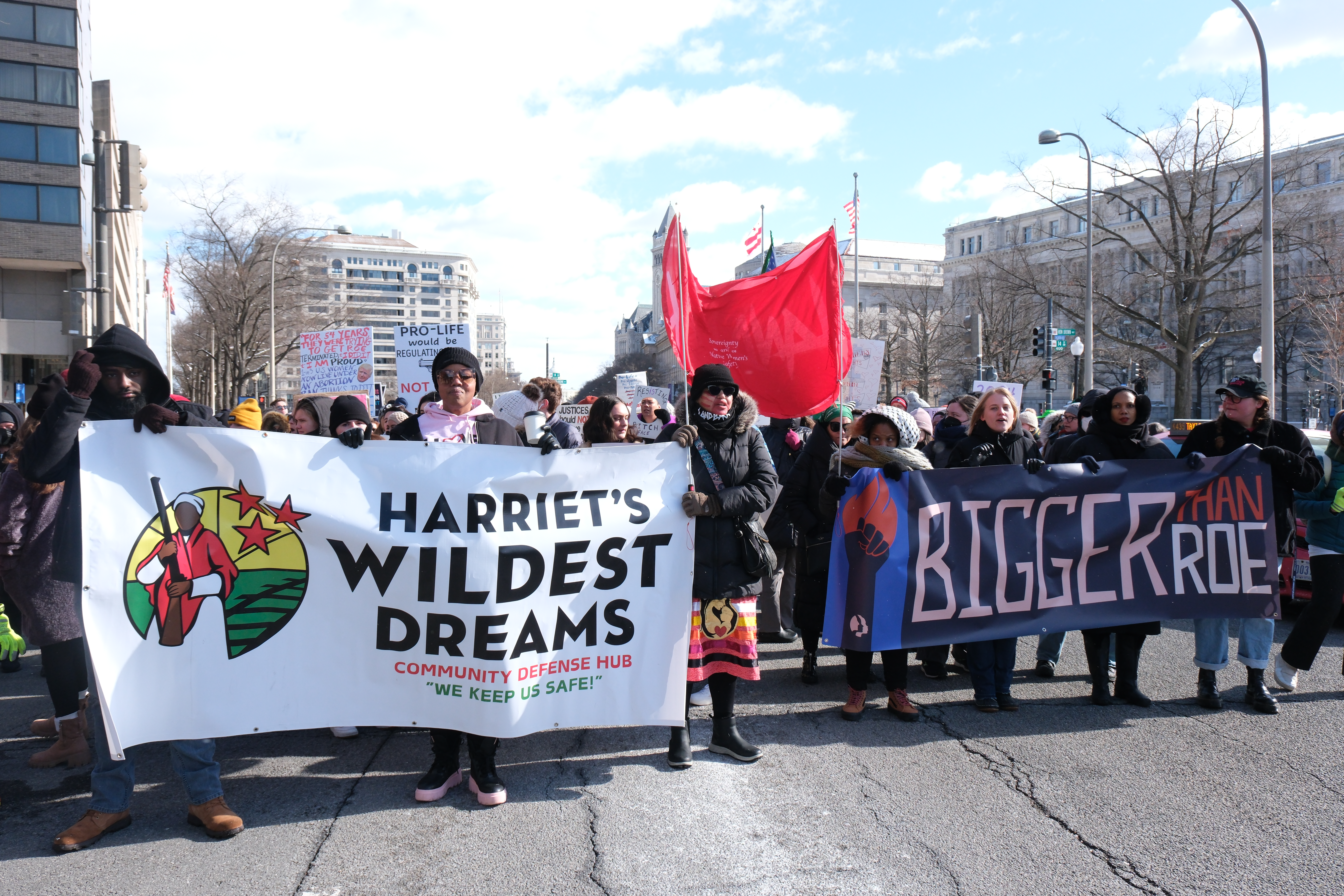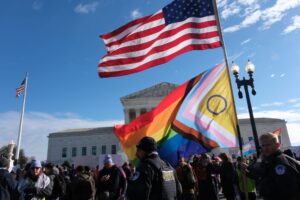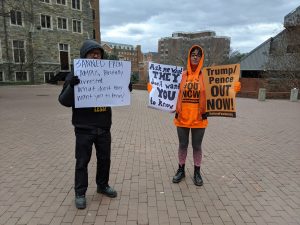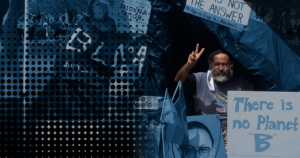Pro-choice and anti-abortion protesters clashed at the annual Women’s March held at Freedom Plaza on Saturday, Jan. 20. Despite below-freezing temperatures, hundreds of demonstrators showed up in support of abortion rights.
The Women’s March is a women-led movement that advocates for a diverse range of issues including anti-racism, voting rights, equal pay, and reproductive freedom. D.C.’s march was held in unison with marches across the country.
Demonstrators have gathered near Capitol Hill annually since the 2017 Women’s March on Washington, a rally in response to the election of former president Donald Trump. Since its inception, the Women’s March has faced controversies such as a lack of diversity in leadership and accusations of antisemitism. In 2019, three co-chairs of the Women’s March, who had faced claims of financial mismanagement and antisemitism, stepped down.
While hundreds of protesters turned out despite the cold this year, the crowd was hardly comparable to the hundreds of thousands of demonstrators who attended in 2017, which was the largest single-day protest in U.S. history.
The march’s theme this year was ‘Bigger than Roe,’ marking 51 years since the Supreme Court’s landmark decision in Roe v. Wade. In June 2022, Dobbs v. Jackson overturned the precedent set by Roe, after the majority opinion was first leaked a month before. The reversal led to restricted abortion access in multiple states and inspired protests in front of the Supreme Court and around the country, with a renewed focus on reproductive rights nationally.
This year’s march, organized by Harriet’s Wildest Dreams (HWD), a Black-led advocacy and abolitionist organization, began at Freedom Plaza at noon. There, speakers addressed the crowd before marching to the White House.
“Today we unite with thousands of people across the country,” said Tabitha St. Bernard-Jacobs, senior advisor at the Women’s March, “who are coming together to send a clear message on the 51st anniversary of Roe v. Wade. And that message is that we’re not going anywhere.”
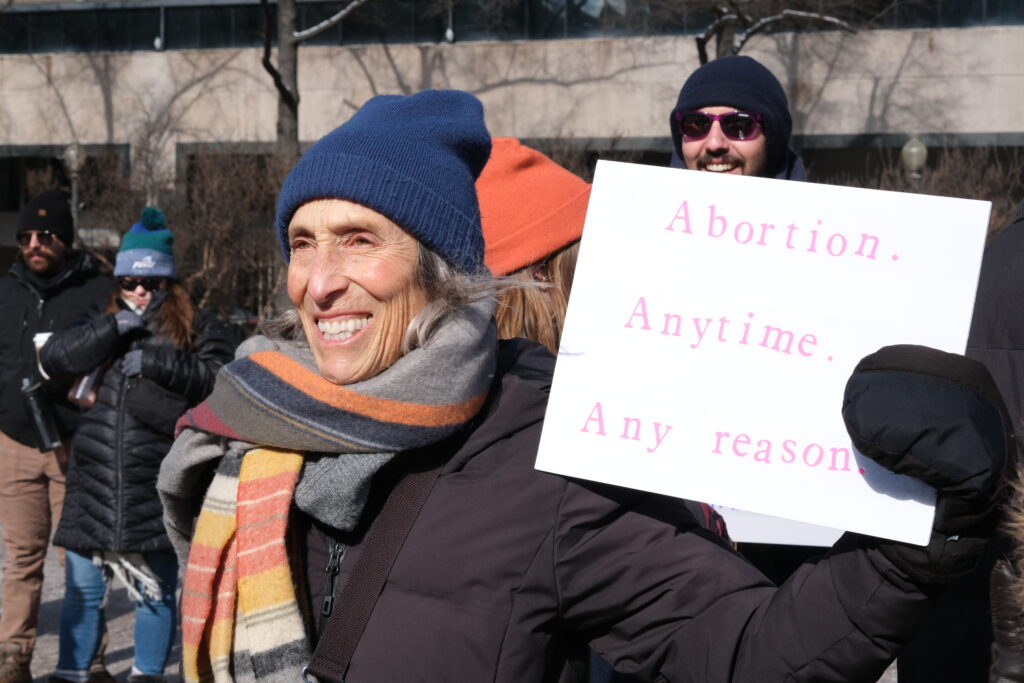 Photo by Sydney Caroll
Photo by Sydney Caroll
Anti-abortion counter-protesters arrived shortly after the beginning of the event, chanting and drumming while the organizers spoke. LiveAction, an anti-abortion group, came with film crews to debate abortion rights with demonstrators.
After several speeches by pro-choice organizers, conflict between protesters and counter-protesters became increasingly intense. After verbal disagreements, a physical brawl between one protester and a counter-protester broke out, leading police to remove the counter-protester. For the remainder of the event, police trailed the demonstration, following the crowd from Freedom Plaza to the White House.
Organizers realized what was happening as counter-protesters approached the event’s speakers and used their own megaphones to heckle during speeches.
“You’re not gonna disrupt my speech, you better get on out of here with that,” Qiana Johnson, Co-Founder/Co-Conductor of HWD and Founder/Executive Director of Life After Release, an organization that advocates for formerly incarcerated individuals said.
Organizers and attendees alike were disheartened by the presence of anti-abortion activists.
“It’s really disrespectful because they had their march yesterday [the March for Life] and they had their time. They had their moment to speak. And then today, they show up in a way that’s really disrespectful to the people that organized today’s protests,” Catherine, a student at American University, said.
Despite disruption from counter-protesters, the rally continued. Jamila White, Commissioner for Ward 8A05, spoke about becoming pregnant unexpectedly while receiving radiation for thyroid cancer. White chose to terminate the pregnancy, as this was the only way to proceed with treatment.
“More than anything, this is my story of choice, that I have the ability and privilege of choosing myself in one of the most challenging times in my very young life. And I want every woman to have the ability to make that choice,” she said. “That choice should not be limited based on your race, socioeconomic status, or your zip code.”
Across the U.S. and in D.C., there are wide healthcare disparities based on race and income, including within reproductive care. Black women face a maternal mortality rate three times higher than that of white women, as well as a 2.4 times higher infant mortality rate. Within D.C., in areas such as Ward 8, where White serves, these disparities are even more pronounced.
“Nearly half of Black Washingtonians live in a medically underserved area, which significantly contributes to the current health outcomes and disparities for Black Washingtonians, especially those of us living east of the river,” White said. “Black women living east of the Anacostia River’s infant mortality rate is six times higher than the district’s average.”
Given these disparities, speakers emphasized that abortion access is also an issue of racial equity.
“Birth care and abortion care is healthcare, and it’s time to destigmatize and acknowledge that abortion is not only reproductive justice, it is racial justice. Black women, our bodies have been controlled, weaponized, and criminalized since the first interactions with European enslavers,” White said. “We are taking back our bodies, we are owning the ability to make choices for ourselves, and we are fighting for every woman to be able to make her choice for herself.”
Protesters also reflected on the importance of demonstrations like the Women’s March in supporting underrepresented and marginalized groups.
“I’m out here marching for the people that can’t be here, the younger people that don’t have the right to vote, their futures, as well as the women who are underrepresented in power,” demonstrator Emily Straight said.
For many, this year’s march was reminiscent of 2017’s march.
“I was here in 2017. And I really believe with the threat of Trump coming back and with the limits to our freedoms ever present in law, we need to continue to be visible opponents to that,” Nancy, a doctor in the D.C. metro area said.
The ongoing genocide in Gaza added a new layer to the day’s demonstrations, with some speakers highlighting the need to stand for individual autonomy in Gaza as well as the US. Many speakers called for a ceasefire and criticized the role of the U.S. in giving military aid to Israel.
“When you go home, tell your elected officials to demand a ceasefire now,” said Jillian Burford, a policy organizer with HWD. “Thousands of Gazans are expected to give birth soon in an active combat zone fueled by American imperialism. One martyr is one martyr too many. We have a duty to fight for all women and gender-nonconforming folks because we keep us safe. And so today, as we fight against the patriarchy, remember that includes abolishing settler colonialism, mass incarceration, and the root of it all, white supremacy.”
The march reflected a range of ongoing national debates, including conversations around reproductive rights, U.S. support of Israel, and white supremacy. Heated clashes, heightened tensions, and urgent calls for action marked the day’s demonstrations. Still, over the yells of counter-protesters, the march’s organizers tried to relay a message of hope.
“The 2024 agenda—and I want to hear you say this with me—is freedom, families, future,” St. Bernard-Jacobs said. “As we fight together, young and old, we see the urgency in shaping a country that respects our choices. We refuse to go gently into a future where our rights are compromised.”


